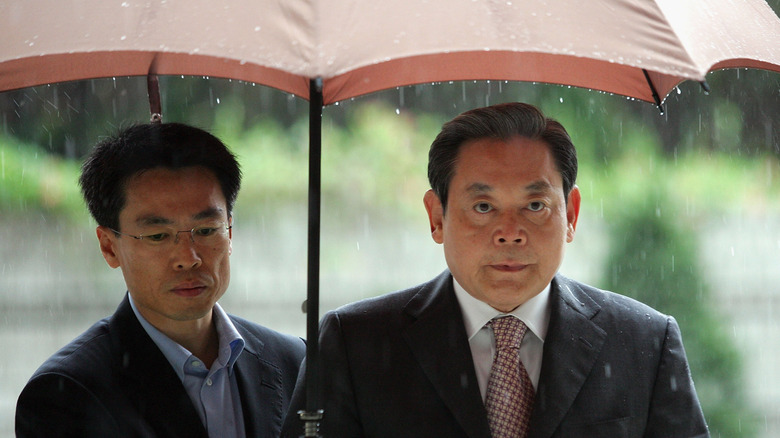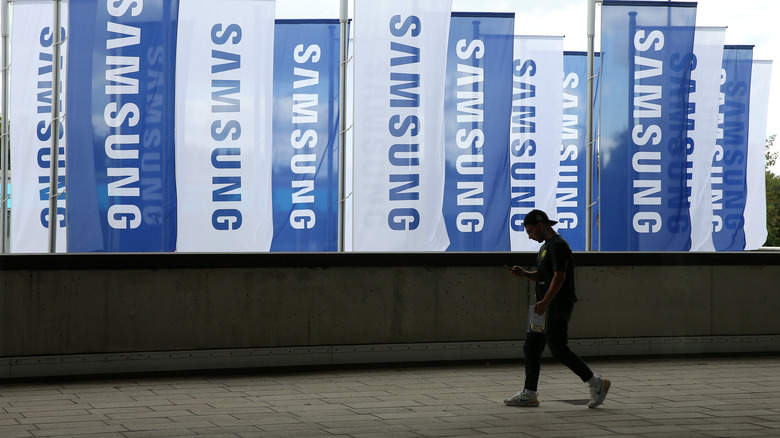Why Lee Kun-Hee Was So Important To Samsung
Lee Kun-Hee, the late CEO of Samsung, left a complex legacy both at his company and beyond. Widely credited with Samsung's expansion from a producer of simple, low-cost electronics to a global market leader in virtually every avenue of consumer technology, Lee Kun-Hee has been synonymous both with Samsung, and with the business culture of South Korea for decades. That reputation has led both to storied success and significant controversy.
First and foremost, Lee Kun-Hee was a major driver of change at Samsung. When Lee became head of the Samsung Group in 1989, it was a very different company. Its electronics division in particular was bluntly a producer of low-cost, low-quality technology and knockoffs of more successful designs.
Per the New York Times, Lee's leadership was vital in Samsung investing in memory chips, flat-panel displays, and middle to high-end smartphones — establishing a profitable relationship with Google's Android platform and turning Samsung technology into a widely admired global brand.
As the Times reported, Lee Kun-Hee saw the potential for growth in the struggling Samsung of 1989, and pushed it forward with ruthless efficiency. In doing so, he would both guide Samsung into its current position as a dominant force in consumer electronics, while also repeatedly violating South Korean law, exemplifying tensions common in global business today.
Samsung's success, by any means necessary
Lee Kun-Hee shaped Samsung by example, both positively and negatively. Samsung's current culture takes cues from Lee's relentless drive for success, but also necessarily treats the longtime CEO as an example of what not to do from a position of power. A number of Lee Kun-Hee's business dealings crossed the line into illegal activity (per The New York Times).
As the Times reports, Lee was convicted of bribing South Korean President Roh Tae-woo in 1996. Over the course of the next decade, investigations into Lee Kun-Hee's finances would reveal the Samsung CEO maintained an independent fund specifically for bribing government officials to obtain preferential treatment for Samsung's finances and products.
This ultimately led to a conviction for tax evasion and a suspended sentence of three years in prison (via Britannica). Lee Kun-Hee would be pardoned again by President Lee Myung-bak, who was shortly thereafter convicted of taking bribes from Lee and the president was sentenced to 15 years in prison.
Bold vision, better safeguards
For better and worse, Lee Kun-Hee's win-at-any-cost approach to business established Samsung as the success story it has become. There is no question that Lee brought a new drive and vision to Samsung, elevating it from a simple producer of subpar electronics, to one of the largest and most successful companies in the world.
Unfortunately, he also established a troubling identity as "too big to prosecute" — an influence broker using bribes and other influence to quash the consequences of serious malfeasance. The Times reports a particularly egregious instance — Lee's pardon for tax evasion came, not because he wasn't guilty of the crime, but because the South Korean government needed him to negotiate the upcoming Olympic Games in Pyeongchang.
More than two years after Lee's death, Samsung is still reckoning with the significance of Lee Kun-Hee's actions, good and bad. Samsung's current leadership, which includes members of Lee Kun-Hee's family, has its own legal baggage. It remains to be seen whether Samsung will be able to strike a balance between Lee Kun-Hee's business acumen and his criminal overreach.


